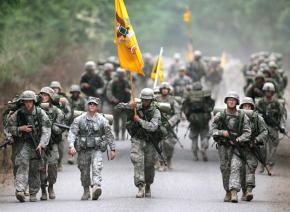Soldiers waiting to explode
Anger has been growing in Afghanistan following the massacre of 16 unarmed civilians--many of them children--by a U.S. soldier on March 11. This comes in the wake of mass protests against the U.S. military after soldiers burned several copies of the Koran.
runs the "pro-soldier, anti-war" Coffee Strong coffeehouse in Lakewood, Wash., providing information and resources to military personnel, veterans and their families. Its statement printed here describes the systematic failures of officials at Joint Base Lewis-McChord to provide support for GIs, despite a history suicides, assaults and other crises on and off the base.
IN THE wake of the killings of Afghan civilians by an Army staff sergeant from Joint Base Lewis-McChord (JBLM), G.I. Voice, the veteran-run nonprofit that operates the Coffee Strong resource center for soldiers near the Washington State base, has called for a Congressional investigation and hearings into "systemic failures" of the JBLM leadership.
Jorge Gonzalez, executive director of G.I. Voice/Coffee Strong said, "This was not a rogue soldier: JBLM is a rogue base, with a severe leadership problem. If Fort Lewis was a college campus, it would have been closed down years ago. G.I. Voice/Coffee Strong calls for an immediate Congressional investigation, and hearings into the multiple crises coming from this Rogue Base."
The military newspaper Stars and Stripes in 2010 called JBLM the "most troubled base in the military," quoting retired Army Gen. Barry McCaffrey on the base's "severe leadership problem." A Los Angeles Times article in 2011 called JBLM a "base on the brink" after a wave of suicides among soldiers sent on repeated deployments.

In October 2011, G.I. Voice/Coffee Strong called for Sen. Patty Murray and Rep. Adam Smith to launch an investigation into the "suicide epidemic" at JBLM, but the two members of Congress took no action. G.I. Voice's "Base on the Brink" campaign was in conjunction with the Iraq Veterans Against the War (IVAW) Operation Recovery campaign, demanding that traumatized military personnel not be redeployed to war zones, because of the severe risks to themselves and to others.
Gonzalez reiterated the earlier call for an investigation and requested that it be expanded to the multiple systemic failures at JBLM, and to hold congressional hearings on these urgent issues. Gonzalez commented:
In 10 years of war, JBLM has produced a Kill Team, suicide epidemic, denials of PTSD treatment, denials of human rights in the brig, spousal abuse and a waterboarded daughter, murders of civilians (including a park ranger), increased sex crimes, substance abuse, DUIs, police shootings of GIs, police violence toward protesters, differential treatment of GIs, and much more. These abuses are not because of a few bad apples, but because of the base's systematic dehumanization of soldiers and civilians, both in occupied countries and at home.
The killings of 16 Afghan civilians in Panjway District near Kandahar, a center of JBLM deployments in Afghanistan, came weeks after a report to the Pentagon by Army Lt. Col. Daniel Davis, in which he stated:
Senior ranking U.S. military leaders have so distorted the truth when communicating with the U.S. Congress and American people in regards to conditions on the ground in Afghanistan that the truth has become unrecognizable. This deception has damaged America's credibility among both our allies and enemies, severely limiting our ability to reach a political solution to the war in Afghanistan.


